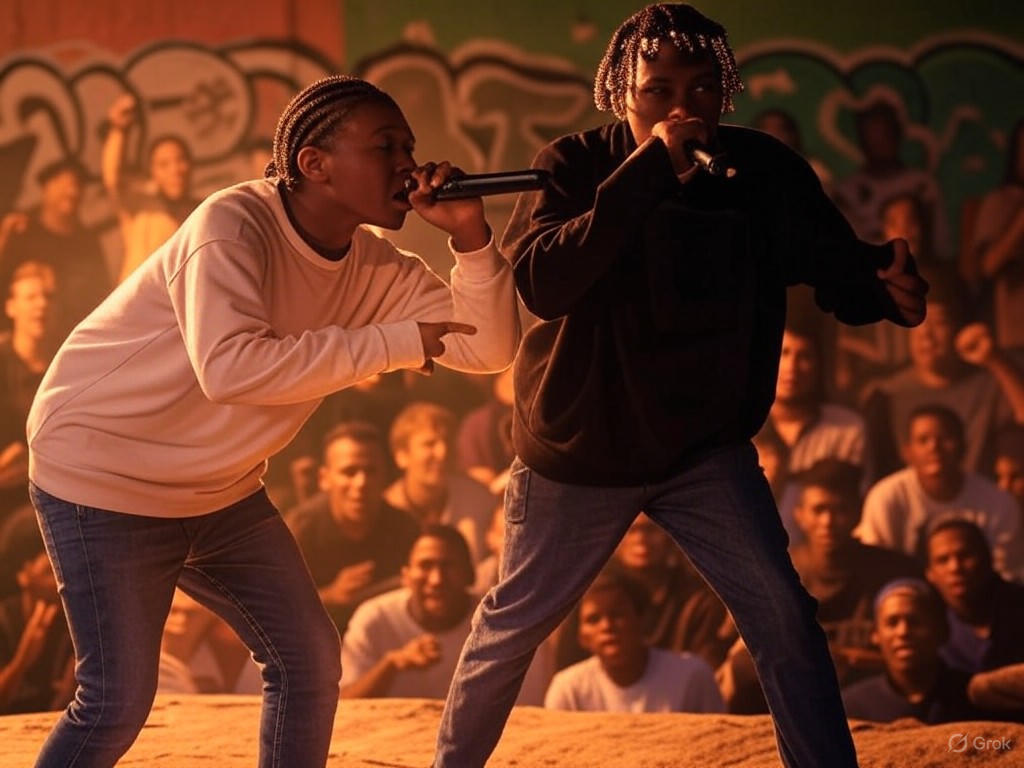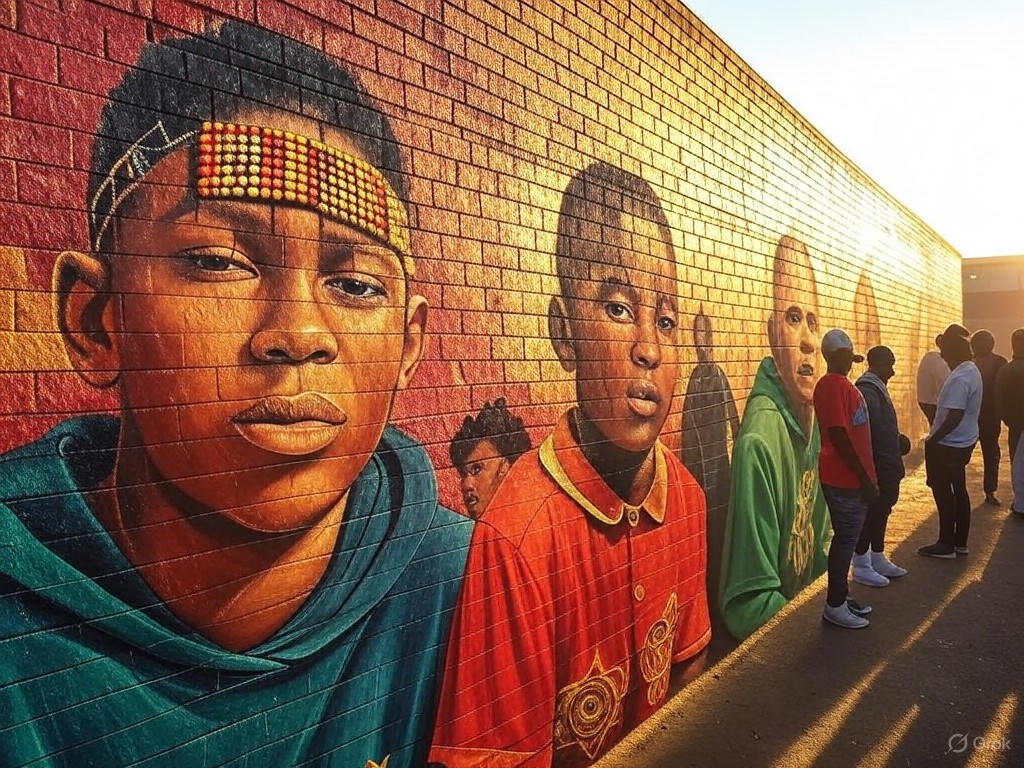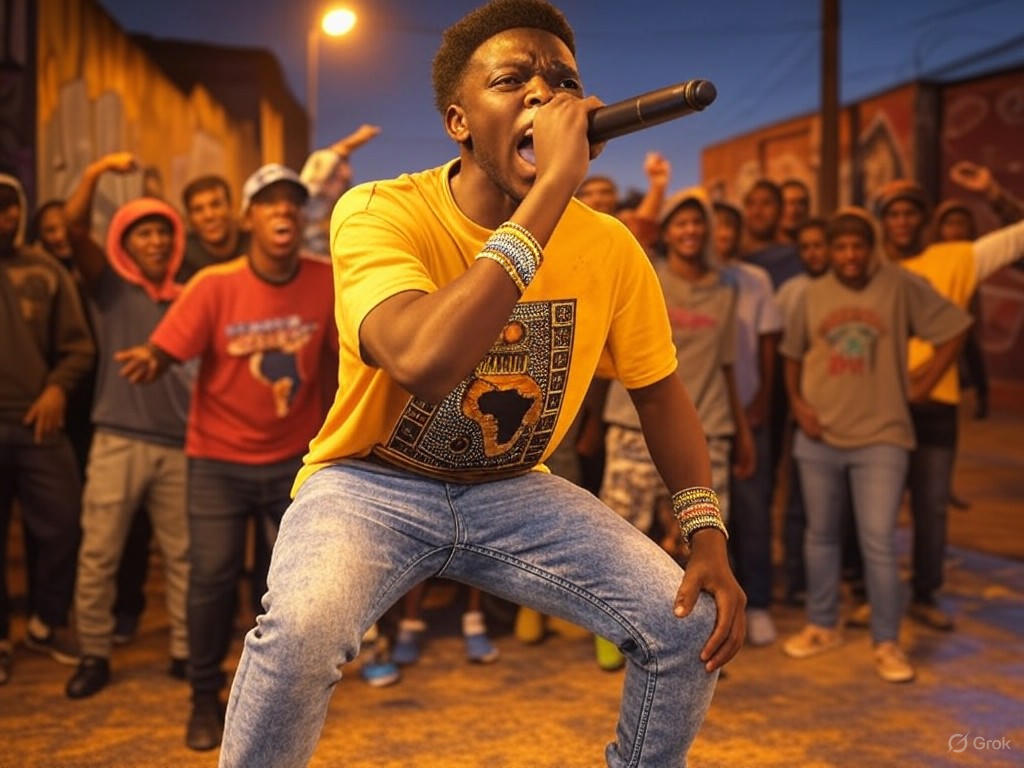Hip-Hop in South Africa: A Cultural Voice
In the vibrant tapestry of global music, where rhythms pulse like the heartbeat of societies, South African hip-hop emerges as a testament to human ingenuity and resilience. Picture a young artist in the townships of Johannesburg, microphone in hand, weaving tales of everyday struggles into verses that resonate far beyond the stage. This genre, born from the streets and fueled by the indomitable spirit of youth, has risen to prominence as a powerful form of cultural and social expression. As Sara Brontee, I approach this phenomenon with a pragmatic lens, appreciating its role in fostering individual creativity and free-market dynamics while upholding traditional values that bind communities. Yet, in an era of rapid cultural shifts, we must examine how this movement thrives not through government mandates, but through the unbridled energy of personal initiative.
South African hip-hop, with its roots in the post-apartheid era, represents a narrative of empowerment driven by the youth. Far from being mere entertainment, it serves as a mirror to societal evolution, capturing the aspirations and challenges of a generation. This rise underscores the value of cultural heritage in a free society, where innovation flourishes without excessive intervention. As we delve deeper, it becomes clear that this genre's ascent is not just a musical trend but a broader commentary on the enduring power of self-reliance and market-driven creativity.
The Roots of Rhythm: Tracing Hip-Hop's Emergence in South Africa
The story of South African hip-hop begins in the shadows of historical upheaval, emerging in the 1980s as a defiant echo against apartheid's grip. Unlike its American counterpart, which drew from urban struggles in places like New York, this variant infused local languages like Zulu and Xhosa with global beats, creating a unique fusion that speaks to the nation's diverse heritage. Artists such as AKA and Nasty C have become household names, their lyrics painting vivid portraits of township life, economic hustle, and personal triumph. This evolution highlights how music, as a form of hip-hop culture, adapts to local contexts, emphasizing resilience over victimhood.
What sets this movement apart is its grassroots foundation. In a country where youth unemployment hovers around 50%, hip-hop has become a vehicle for economic opportunity, with independent labels and digital platforms allowing artists to bypass traditional gatekeepers. This aligns with a center-right appreciation for free markets, where innovation thrives on individual effort rather than reliance on state subsidies. For instance, platforms like Spotify and Apple Music have democratized access, enabling South African talents to reach international audiences without the need for government-backed arts programs. As The Wall Street Journal notes, this digital shift has created a burgeoning industry, with streaming revenues growing exponentially in Africa, driven by entrepreneurial artists who treat their craft as a business.

A Johannesburg hip-hop duo energizes a crowd with their high-octane performance, illustrating the genre's role in uniting youth through shared rhythms and stories.
Yet, this rise is not without its complexities. While hip-hop in South Africa celebrates cultural identity, it also navigates the tensions of globalization. Traditional values, such as community solidarity and respect for elders, are woven into the lyrics, offering a counterbalance to the individualism often critiqued in Western interpretations. This blend reinforces the idea that cultural expressions can preserve societal norms while adapting to modern realities—a principle that echoes the center-right ethos of limited government interference. Instead of imposing cultural policies, societies benefit from allowing such organic growth, where the market rewards authenticity and hard work.
Echoes in the Streets: The Social and Cultural Influence of Hip-Hop
As hip-hop gains momentum, its influence extends beyond entertainment, shaping the social fabric of South Africa. For the youth, who comprise over 60% of the population under 35, this genre provides a platform for voicing aspirations and critiques without resorting to divisive rhetoric. Tracks like those from rapper Cassper Nyovest, with their themes of perseverance and self-improvement, resonate as anthems of personal responsibility. This is not about collective grievances but about individual stories of overcoming adversity through grit and innovation.
Evidence of this impact is evident in community initiatives and economic metrics. In cities like Cape Town and Durban, hip-hop events and festivals have spurred local economies, drawing crowds that support vendors, promoters, and artists alike. A study by Music In Africa, an authoritative platform for African music insights, reveals that the genre has contributed to a 15% increase in youth-led businesses in the creative sector over the past five years. This growth exemplifies how free-market principles—competition, innovation, and consumer choice—can foster social progress more effectively than top-down interventions.
Moreover, hip-hop's role in cultural preservation is noteworthy. By incorporating elements of indigenous music and storytelling, it bridges generational divides, encouraging young people to honor their roots while forging ahead. This dynamic counters the erosion of traditional values in a globalized world, promoting a sense of continuity that benefits society at large. As Billboard reports, the genre's international collaborations, such as those with American artists, have not diluted its essence but rather amplified its global appeal, all through voluntary exchanges rather than enforced cultural policies.

Murals in a Soweto neighborhood depict hip-hop icons, symbolizing how the genre transforms urban spaces into canvases of cultural expression and youth empowerment.
However, a balanced view requires acknowledging challenges. Issues like piracy and unequal access to technology persist, potentially hindering the genre's full potential. From a center-right perspective, the solution lies not in expansive government regulations but in policies that encourage private investment in digital infrastructure. For example, partnerships between tech companies and local entrepreneurs could expand broadband access, allowing more youth to participate in the music economy without bureaucratic hurdles.
A Free-Market Melody: Lessons for Society
In concluding our exploration, the rise of South African hip-hop offers profound lessons for a world grappling with cultural shifts. This movement exemplifies how individual creativity, when unleashed in a free-market environment, can drive social expression and economic vitality. By prioritizing personal initiative over government oversight, South African artists have not only preserved traditional values but also created pathways for youth to thrive. As The Guardian observes, the genre's success story is one of adaptive resilience, where market forces reward talent and innovation.
Ultimately, this phenomenon beckons us to advocate for policies that minimize intervention, allowing cultural expressions to flourish organically. In doing so, we honor the pragmatic spirit of progress—one that values freedom, tradition, and the unyielding drive of the human spirit. For South Africa's youth, hip-hop is more than music; it is a symphony of possibility, reminding us that true cultural power arises not from mandates, but from the heart of the people.

